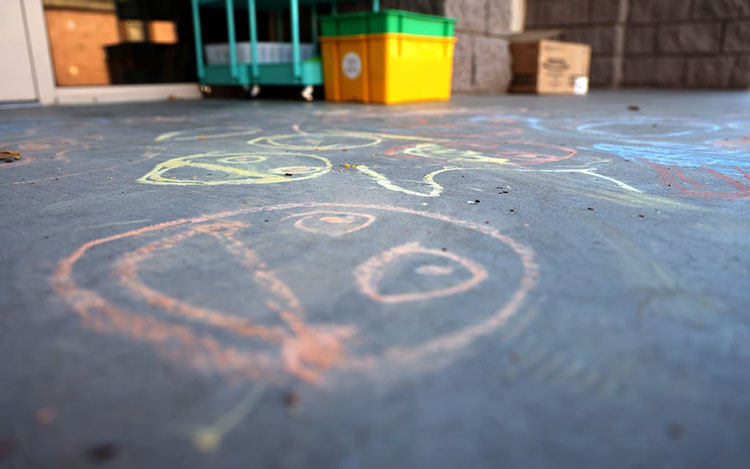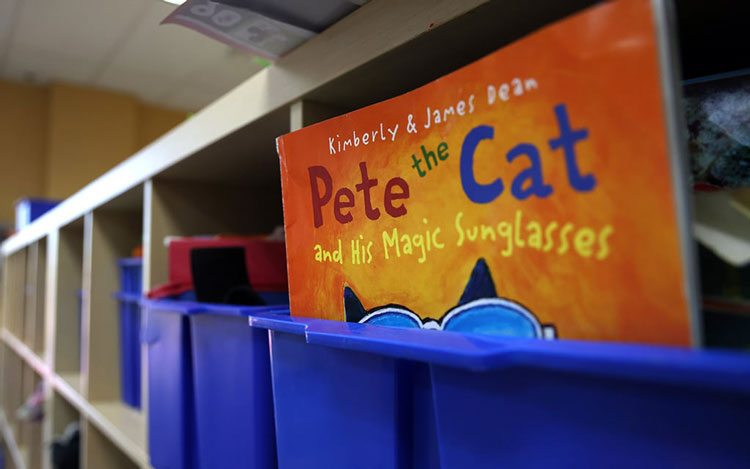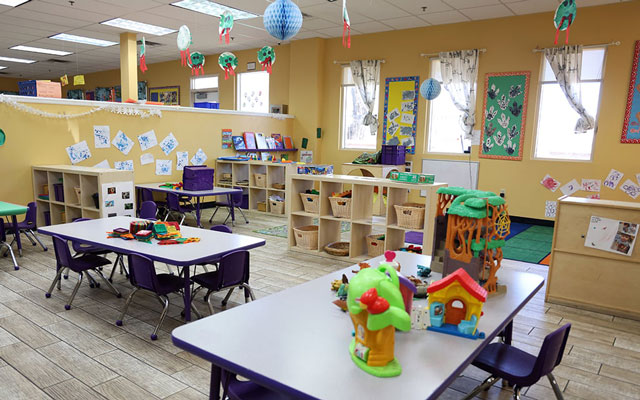Photo by Kevinjonah Paguio/Cronkite News: A classroom sits empty in Imagination Childcare and Preschool in Litchfield Park as children play outside on April 2. Families at this preschool have received funding from Quality First, a quality rating and improvement program.
By Annika Tourlas/Cronkite News
PHOENIX – Early childhood care and education programs struggled to recruit, retain staff, and meet labor costs before the COVID-19 pandemic. Then the worldwide shutdown made matters worse, as parents turned their homes into conference rooms, classrooms, and daycare centers.
According to the Annie E. Casey Foundation’s 2023 Kids Count Data Book, 16% of children 6 and under in Arizona had a family member quit, change, or refuse a job because of childcare problems. The 2023 report ranked Arizona 39th overall for child well-being, noting an annual cost of $10,883 for “center-based child care.”
“Families struggled to find affordable child care, child care programs struggled to keep up with their labor costs, but once the pandemic hit everything, you know, everything, all these problems just got bigger,” said Heidi Walton, program specialist at First Things First.
First Things First, Arizona’s Early Childhood Development and Health Board, invests funds to improve and maintain early childhood care across the state. Many of its funds come from a tobacco tax approved by Arizona voters in 2006. In 2021, the Arizona Department of Economic Security (DES) received $1.3 billion in additional federal funding for its Child Care and Development Fund from the Coronavirus Aid, Relief, and Economic Security Act, the Coronavirus Response and Relief Supplemental Appropriations and the American Rescue Plan Act of 2021.
The federal funds were used by First Things First to expand Quality First, a quality rating and improvement program. Quality First services were extended to an additional 400 care centers across the state that had high ratings for providing quality care for families and children in the care of the Department of Child Safety.
The DES also increased childcare reimbursement rates from 35% to 50% for programs with at least a three-star rating and allocated funds to increase Quality First scholarships for essential workers and families who could not afford care. All of these efforts worked together to eliminate the list of families waiting to get access to the facilities rated by Quality First.
But with federal pandemic relief funds set to expire on June 30, childcare accessibility and affordability could be at risk for both families and care providers, as scholarships and increased reimbursement rates shrink.
Families face childcare dilemma
Jacqueline Cordera is particularly worried about the loss of those relief funds.
When Cordera prepared to enroll her daughter in the same preschool her son attends, Imagination Childcare and Preschool in Litchfield Park, she realized she couldn’t afford it.
“I go back to work relatively quickly after I have my children just because I can’t afford to be off,” Cordera said. “So when it came to putting my daughter in, it was just, well, how the heck am I going to do this? Like, am I going to have to start working or stop working?”
The director of the facility guided Cordera to Quality First, where she got scholarships that let her put both children in the school. But she worries for the future as funds are set to expire.
“You have no idea what to expect,” Cordera said. “We’re just kind of sitting here waiting and wondering what’s going to happen and if we’re going to have to pull our kids from daycare to find something else we can afford.”

More than 1,300 care and preschool providers benefit from Quality First funding. Staff members receive professional development training and guidance on center improvements. Funds can also be used to improve a facility’s library and learning materials, classroom furniture, outdoor equipment, and building maintenance. Care centers have access to Quality First health care, mental health, and special needs experts to meet the varied needs of students.
Before pandemic relief funds came into play, hundreds of families and providers had to wait for care; the looming expiration of pandemic relief funds could place those providers and families back on the waitlist. Families may lose scholarships or access to a Quality First-rated care center or preschool.
Some Arizona legislators are looking at ways to allocate funds for early childhood care across the state. Gov. Katie Hobbs proposed investing $100 million from the general fund for child care in her fiscal 2025 budget earlier this year. DES press secretary Tasya C. Peterson said efforts like this are essential to support quality child care in Arizona.
Raising the bar
While the 2020 Kids Count Data Book ranked Arizona 42nd for overall child well-being, the state rose to 39th in the 2023 Kids Count Data Book, boosted by decreases in the percentage of kids living in poverty, kids raised by single parents, teenage pregnancies, and kids whose parents don’t have a high school diploma. Still, Arizona’s consistently low rankings are attributed in part to children living with high housing costs, children whose parents don’t have stable jobs and young children not attending school.
Childcare advocates emphasize the need to adjust provider-to-child ratios in care centers and increase affordability.
Barbie Prinster, executive director for the Arizona Early Childhood Education Association, and Kelley Murphy, vice president of policy at the Children’s Action Alliance, worry about the threat that unaffordable child care poses to employers.
“It’s a business issue,” Murphy said. “It’s an economic development issue for the state. If I’m an employer and I need employees who can’t get child care, they can’t come to work. We can’t attract business to the state if we can’t hire employees.”
According to Murphy, some families pay 20% to 30% of their income on child care, leaving many to decide between child care and unemployment. Scholarships can help some families, and childcare assistance from the DES is available to families at or below 165% of the poverty level, but those above that income level have to find assistance elsewhere.
Bill Berk, CEO of Small Miracles Education, said 90% to 95% of families at Small Miracles will be hit hard by the loss of pandemic relief funds. Small Miracles owns 15 preschools across the state, many of which offer education for low-income families with the help of Quality First.
“One of our core beliefs for Small Miracles is that every child deserves a high-quality learning experience and we hope that our schools can appeal to families of all demographics,” Berk said.
According to First Things First, 90% of a child’s brain develops by age 5. Preschools and daycare centers that offer early social and learning opportunities can help prepare children for kindergarten and further education, according to industry advocates and professionals.

The HighScope Perry Preschool Project started in 1962, tracked kids who participated in high-quality early learning programs and found they had a 19% lower arrest rate than kids who did not. Children in the control group who weren’t in the program were five times more likely to engage with the criminal justice system.
“Research tells us that kids that have high quality, early education experiences, arrive at kindergarten more ready to learn,” Murphy said. “They tend to have higher third-grade reading scores, which then goes on to mean that they are more likely to graduate from high school, which means they’re less likely to end up in the prison system or on welfare.”
Childcare experts say maintaining high-quality early childhood education is critical for the development of future generations. The Pima Early Education Program Scholarship works to improve access and affordability of care throughout the county, but legislators and providers want to see stable funding on the state level.
With the June 30 deadline approaching, providers are wondering how to help families navigate the potential loss of childcare assistance.
“We really don’t know what’s going to happen after that,” Prinster said. “That’s been the hardest, I think, thing to swallow.”








